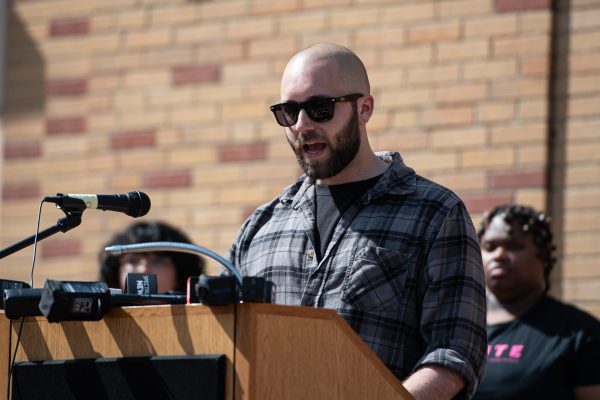Hartville Village Council will open with prayer
April 25, 2006
Beginning next month, the Hartville Village Council will open every meeting with a prayer.
After months of deliberation and despite the opposition by the mayor of Hartville, Beverly Green, the members of the council voted 4-2 last Tuesday to pass the resolution allowing the council to start meetings with a prayer.
“We asked her (Green) and she said no,” Council President Linda Miller said, “but we decided to still pursue it.”
Hartville Village is located in the northern part of Stark County and has a population of 2,300 people.
Hartville is known to have a strong religious community and, at one time, had a mayor who supported prayer at council meetings.
“Our previous mayor, Owen Stoll, had prayer before meetings,” Miller said. “But the new mayor chose not to.”
Bruce Klipec, who has been a member of the Hartville Village Council for nearly 10 years, said many clergymen were against the spoken prayer when it was practiced during Stoll’s term.
“We did not pray that much,” he said. “Within the last year of his term, I can’t remember the number of times that it was done.”
Klipec said three new recently elected council members brought the issue to the table a few months ago.
“They’re trying to imprint their own tenure on the council,” he noted. “One of them happens to be a part-time minister.”
Rather than having a spoken prayer, which is what the council was fighting for, Green and Klipec preferred to have a silent prayer.
“I am a practicing Roman Catholic and I believe in prayer, going to church, and worshiping in your own way,” Klipec said. “I believe our Constitution gives us the option to pray, but the other thing the Constitution says is that government should not dictate prayer.”
The village council passed to have a voiced prayer through a resolution, rather than an ordinance, with hopes of avoiding a lawsuit.
Paul Haridakis, an attorney and legal expert, said there still is an issue with passing it as a resolution.
“Whether they passed it as a resolution or as an ordinance does not matter,” Haridakis said. “It is an issue if it is violating the separation of church and state.”
Klipec said he is worried that groups like the American Civil Liberties Union, Wiccans and atheists could go after the case and take it to court.
Klipec said the ACLU has already put in a request to see the legislation the day after it was voted into effect.
“I’m concerned for the finances of the village,” Klipec said. “And if we lose in court, we are going to have to pay both sides of the legal fees.”
During the last meeting, Klipec made a suggestion that would resolve the village from paying the fees and instead, would make the four members who voted “yes” liable for any court costs related to the issue.
Klipec said he “made the suggestion but was told by the solicitor that it is not possible, stressed, and that since it’s a vote of the council, the village has to pay for its indiscretions.”
Haridakis compared the situation to the case heard by the U.S. Supreme Court in March 2005 regarding whether the Ten Commandments could be displayed on a government property.
The court forced the removal of a monument that displayed the Ten Commandments in front of a judicial facility in Alabama, ruling that it violated the U.S. Constitution’s separation of church and government principle.
Haridakis added that a court could rule in favor of the council’s decision to pray by looking at the daily sessions of the U.S. Congress, which open up with a prayer.
“It’s just a matter of whether somebody is interested in challenging it,” he said. “But it will probably invite some scrutiny.”
In a recent case in Stow, a U.S. district judge ruled the city seal unconstitutional, saying it promoted Christianity over other religions. The seal was redesigned and images of a cross and a Bible, which were previously displayed, were removed.
“Members of the community could do something about it because it is their council,” Haridakis noted. “The council represents them, and the meetings are open to the public.”
In order to change the legislation, 10 percent, which is about 70 people, of the village’s registered voters would have to sign a petition. If the petition is successfully circulated within the next 30 days, the issue would be put on the November election ballot.
Klipec said another way that the legislation could be revoked is if the council members who voted for it, have a change of heart and negate it.
But strong supporters of the legislation may find it difficult to take back something they believe in so adamantly.
Miller, who plans on inviting local pastors for prayer at the council meetings, explained why she thinks the legislation is necessary.
“I believe that we need to seek God’s guidance in the decisions that we make in every area of our lives.”
Contact public affairs reporter Karina Arutyunova at [email protected].























